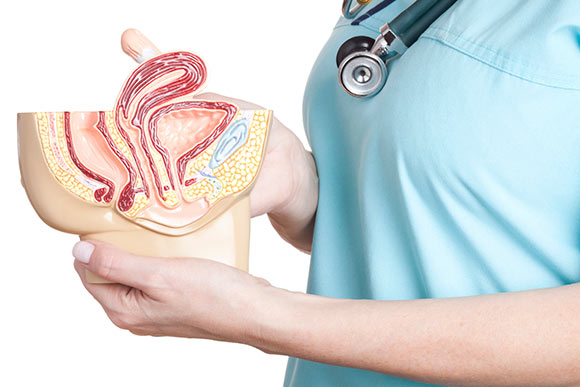Pelvic organ prolapse (POP) is primarily caused by the weakening or stretching of the pelvic floor muscles and tissues that support the pelvic organs. Several factors contribute to this weakening, leading to the descent of pelvic organs into the vaginal space. Common causes include:
- Childbirth: The act of giving birth, especially through vaginal delivery, can stretch and weaken the pelvic floor muscles and supportive tissues. The risk increases with the number of vaginal deliveries.
- Aging: The natural aging process can lead to a gradual loss of elasticity and strength in the pelvic tissues, making them more prone to prolapse.
- Hormonal Changes: Reduced levels of estrogen during menopause can contribute to the weakening of pelvic muscles and tissues, increasing the risk of prolapse.
- Chronic Conditions: Conditions that cause increased intra-abdominal pressure, such as chronic constipation, chronic coughing (due to conditions like chronic bronchitis or smoking), and obesity, can strain the pelvic floor and contribute to prolapse.
- Genetics: There may be a genetic predisposition to pelvic organ prolapse. If a woman’s mother or sisters have experienced prolapse, she may have an increased risk.
- Hysterectomy: Surgical removal of the uterus (hysterectomy) can alter pelvic anatomy and increase the risk of prolapse, especially if other supporting structures are weakened during the procedure.
- Connective Tissue Disorders: Conditions that affect the strength and integrity of connective tissues, such as Ehlers-Danlos syndrome or Marfan syndrome, can contribute to pelvic organ prolapse.
- Heavy Lifting and Straining: Regularly engaging in heavy lifting or activities that involve repetitive straining can contribute to pelvic floor muscle weakness and increase the risk of prolapse.
- Obesity: Excess body weight can put additional stress on the pelvic floor muscles, contributing to their weakening and increasing the likelihood of pelvic organ descent.
It’s essential to note that pelvic organ prolapse is a multifactorial condition, often influenced by a combination of these factors. Additionally, some women may be more predisposed to prolapse based on their individual health history and genetic factors. If someone experiences symptoms suggestive of pelvic organ prolapse, consultation with a healthcare professional, such as a gynecologist or urogynecologist, is crucial for an accurate diagnosis and appropriate management.
Empower your health journey with Dr. Deepika, your dedicated Gynecologist in Borivali. Compassionate care, personalized solutions. Book your appointment today and prioritize your well-being with a trusted expert.

